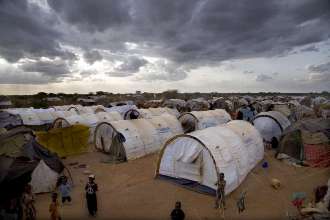Summary
The present report is submitted pursuant to General Assembly resolution 70/134 on assistance to refugees, returnees and displaced persons in Africa. It updates information contained in the report of the Secretary-General submitted to the Assembly at its seventieth session (A/70/337) and covers the period from 1 July 2015 to 30 June 2016. The report has been coordinated by the Office of the United Nations High Commissioner for Refugees and includes information provided by the Office for the Coordination of Humanitarian Affairs of the Secretariat, the International Labour Organization, the Office of the United Nations High Commissioner for Human Rights, the United Nations Entity for Gender Equality and the Empowerment of Women, the World Food Programme, the World Health Organization, the United Nations Development Programme, the United Nations Population Fund and the United Nations Children’s Fund. It also includes information drawn from publicly available reports by the Internal Displacement Monitoring Centre.
I. Introduction
New and ongoing conflicts have generated further displacement in the Africa region1 over the past year. Violence in Burundi, the Central African Republic, Nigeria and South Sudan displaced hundreds of thousands of people internally and across borders, while the deteriorating situation in Yemen caused significant numbers to flee across the Red Sea and the Gulf of Aden and seek safety in different countries in the region. Meanwhile, protracted conflicts in the Democratic Republic of the Congo, Mali, Somalia and the Sudan prevented millions from returning home.
As at the end of 2015, there were around 12 million internally displaced persons in Africa.2 Their largest numbers were concentrated in the Sudan (3.2 million), Nigeria (2.1 million), South Sudan (1.7 million), the Democratic Republic of the Congo (1.5 million) and Somalia (1.2 million). Sub-Saharan Africa was home to the largest number of refugees in the world (an estimated 4.4 million). Refugees originating from the Central African Republic, the Democratic Republic of the Congo, Somalia, South Sudan and the Sudan accounted for 80 per cent of that figure.
The majority of countries in Africa continued to uphold their long-standing tradition of hospitality towards and solidarity with refugees. Five African countries were among the world’s top 10 refugee-hosting countries: Ethiopia, Kenya, Uganda, the Democratic Republic of the Congo and Chad. Despite this generosity, the economic, political and security challenges associated with hosting large numbers of refugees for an extended period cannot be underestimated.
The failure to address the root causes of conflict, together with insecurity and widespread human rights violations, were the main reasons behind the chronic nature of displacement in the region and the insufficient progress made with regard to the securing of solutions for displaced people. Meanwhile, food insecurity affected many refugees and internally displaced persons, with levels of acute malnutrition, stunting and anaemia on the rise. Aid agencies faced obstacles to gaining access to affected populations, which further exacerbated the humanitarian situation in some operations. In some of the most affected areas, food insecurity prompted negative coping strategies, including survival sex. Other challenges included the failure to ensure the civilian nature of asylum and of refugee camps, incidents of sexual and gender-based violence and insufficient funding for humanitarian operations.
| Themes |
| • Advocacy • Armed / ethnic conflict • Displaced • ESC rights • Extraterritorial obligations • Forced evictions • Human rights • Refugees • UN HR bodies |














